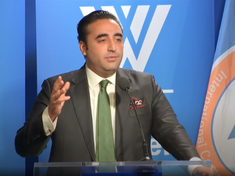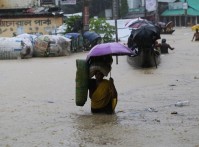-
Catastrophe and Catalyst: Pakistan’s Foreign Minister on His Nation’s Climate Tragedy
September 30, 2022 By Claire Doyle
On a recent visit to the Wilson Center, Pakistan’s Foreign Minister Bilawal Bhutto Zardari remarked on the historic nature of the monsoon-related floods that have submerged a huge swath of his country over the last several months.
“These are no normal monsoons and no normal floods,” said Zardari. “We are used to monsoons. We are used to floods. We have provincial mechanisms [and] national mechanisms to deal with such disasters. What we were not prepared for was for floods to descend from the sky.”
On a recent visit to the Wilson Center, Pakistan’s Foreign Minister Bilawal Bhutto Zardari remarked on the historic nature of the monsoon-related floods that have submerged a huge swath of his country over the last several months.
“These are no normal monsoons and no normal floods,” said Zardari. “We are used to monsoons. We are used to floods. We have provincial mechanisms [and] national mechanisms to deal with such disasters. What we were not prepared for was for floods to descend from the sky.”
This week’s episode of the New Security Broadcast features Zardari’s observations on the catastrophic flooding in Pakistan, which is so extensive it is visible even from outer space. From July to mid-September, Pakistan was battered by heavy, unrelenting monsoon rains that scientists say were made more likely by climate change.
With fully one-third of Pakistan now underwater, the disaster has resulted in a humanitarian crisis that is still unfolding. Zardari said that more than 33 million people—greater than the population of Sri Lanka or Australia—have been impacted, including 16 million children and 600,000 pregnant women. Key infrastructure has been decimated, and at least 4 million acres of crops were destroyed.
Such large-scale devastation means that Pakistan’s path to recovery is sure to be long and challenging, not least because the flood emergency is likely to trigger other related emergencies.
Agriculture is one key area of concern. Zardari noted that the damage to agricultural land will put even more pressure on Pakistani people’s food security and livelihoods, which are already strained by constricted food supply from the war in Ukraine. Although many of those impacted by the disaster were not living in poverty before the floods, millions of small farmers have now lost their main source of income.
Zardari adds that another crisis in public health is looming as well: “We’re looking at—as the WHO has warned—a second catastrophe, a health catastrophe, with waterborne diseases spreading at epidemic rates and our supplies of basics like Panadol and anti-malaria medication not [keeping] up.”
Pakistan’s Foreign Minister sees climate injustice at the center of his nation’s current calamity. Zardari says that the 33 million people impacted by the disaster “are paying in the form of their lives, in the form of their livelihoods for global warming that they didn’t create.” Pakistan’s share of the global carbon footprint is a meager 0.8 percent. “The ten most climate stressed countries—of which Pakistan is one—have contributed negligibly to the overall carbon footprint,” Zardari observed. “But they are going to be the frontline victims.”
Despite this fact, “Loss and Damage is a conversation we’re still debating,” adds Zardari. He says that it is critical that there be international follow-through on climate finance commitments.“ As the UN Secretary-General has stated, this is not about charity,” said Zardari. “This is about economic justice.”
Once the floodwaters recede, Zardari says the country will rebuild in a way that accounts for climate change. “We don’t only want reconstruction and rehabilitation to take place,” he continued, “…we want [them to take place] in a climate resistant manner. A greener manner.” Offered a chance for Pakistan to become a test case for green infrastructure, Zardari believes that the choice is clear: “Either we do it cheaply and poorly and dirtily and wait for the next flood…Or we do it right.”
Looking beyond Pakistan, Zardari holds that “dialogue and diplomacy” are central for global action on climate change. It is time for multilateralism, not war, he stressed, adding that successful US-China cooperation on climate is especially important. “History will ask us: While our planet was burning, while we were being warned time and time again—from [former U.S. Vice President Al] Gore to Greta [Thunberg]—that the climate is in imminent danger, did we choose to ignite new conflicts, provoke new tensions, busy ourselves with the conflicts of man? Or did we rise to this occasion?”
While Pakistan’s disastrous flooding has brought tragedy to his nation, Zardari also sees this catastrophe as a bellwether of increasing global climate threats: “It is us today, it could be anybody else tomorrow.” Pakistan’s Foreign Minister added that the devastation in Pakistan should be a catalyst for other nations to develop stronger disaster preparedness: “What we have to do is ensure that while there was no script for us, while there was no ready-made plan for us, the next time this happens to some other country, we are more prepared.”
New Security Broadcast is also available for download on iTunes and Google Podcasts.
Sources: American Red Cross
Photo Credit: His Excellency Bilawal Bhutto Zardari speaking at the Wilson Center on September 27, 2022, courtesy of the Wilson Center.
 A Publication of the Stimson Center.
A Publication of the Stimson Center.







